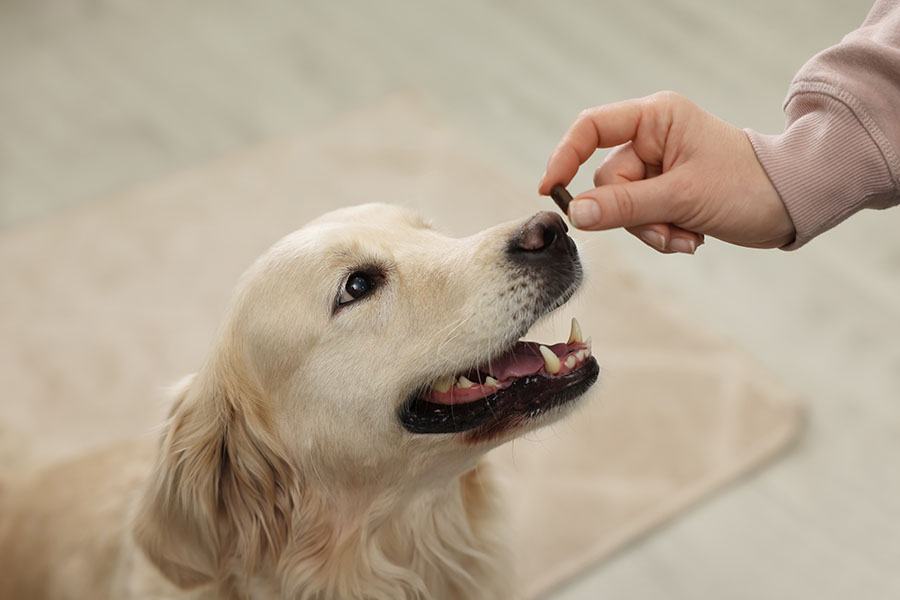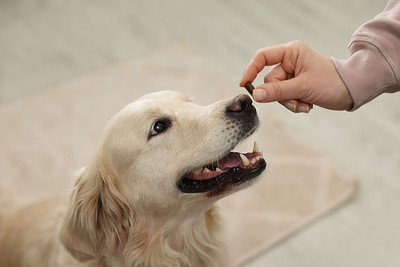Posted by Hannah Walters on Apr 06, 2023

Struggling to get your pup to take their medication each morning?
Veterinary medicine is designed and manufactured to be as easy and stress-free as possible for your pet. However, if you find that you’re still having issues getting your dog to ingest their tablets, then positive reinforcement training can help make the process simpler and more enjoyable for both of you. By using verbal praise, treats, or access to a favourite toy, you can reward them for successfully taking their pills.
What is positive reinforcement training?
Positive reinforcement training is a method which teaches your dog desired behaviours through rewards and praise when they succeed. This humane technique is designed to encourage good behaviour by providing positive feedback when your dog successfully completes a task. This kind of training has been proven to be more successful than punishment-based approaches since it encourages good behaviour without resorting to fear.
Where to begin:
Start small - Begin positive reinforcement training in an environment where there are no distractions, and your pup can focus on the task. That may mean some extra effort on your part in terms of noise level and other distractions, like other people or animals. It'll also help if you keep the sessions short and sweet so that your pup doesn’t become overwhelmed.
Use consistent verbal cues - Consistency is key when training your dog to take their tablets, not only will it provide a clear signal as to when it’s time to take their medication, but it also helps to build trust between you and your pup. Try to ensure your verbal cues are the same every time to prevent confusion, something as simple as “tablet time!” should do the trick. With enough practice, your pup should soon be able to recognise that phrase and will begin to associate it with taking their medication without hesitation.
Offer rewards for correct behaviour - Rewarding your pup for their correct behaviour when training them to take their medication is essential for success. Each time your pup takes their medication without a fuss, make sure to offer some kind of reward – whether it be a treat, game, or simply verbal praise. It's also important to build up your pup’s enthusiasm and motivation with each successful attempt at taking their medicine to ensure that they continue to do the right thing.
Repeat, repeat, repeat -Repetition is key when training your pup on anything new, make sure to repeat the process every day until your pup is comfortable taking their medication on their own. Each time you give your pup their tablets, ensure to always follow the same steps for rewarding them, this will encourage them to learn and understand. This repetition of cues and rewards will help build their understanding of the process, allowing them to become more comfortable with taking their medication. Once they understand exactly what is expected of them, they will be more likely to take it voluntarily – allowing both you and your pup some peace of mind!
Don’t forget the fun stuff - Include plenty of playtime in between these training sessions to keep your dog engaged. Taking regular breaks for fun activities will let them relax and better understand the concept of taking their medicine. Not only does it bond you two together, but it also creates a positive environment for them to learn in. So, don't forget to put some serious playtime into practice when trying to teach your pup how to take their medication!
Summary
Using positive reinforcement training to encourage your dog to take their medication is a very successful technique, even though technology has enabled them to be manufactured to be easier to take. The repetition of cues and plenty of playtime between training makes it much easier for the pup to learn and eventually become comfortable with taking their tablets voluntarily. By using positive reinforcement methods, you will build a strong bond while also giving your pup some peace of mind.
